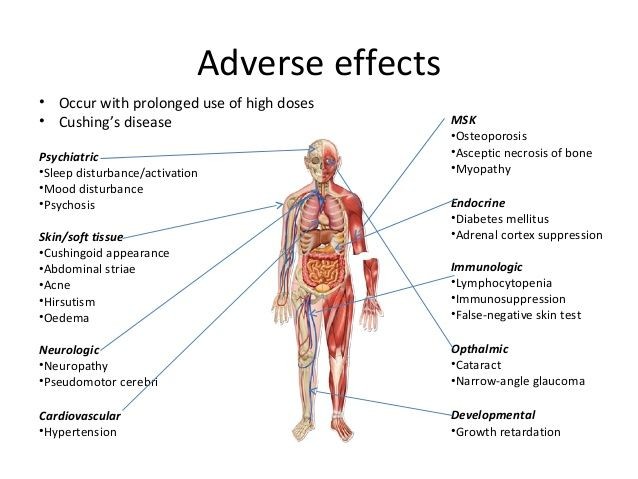
Contents
Prednisone Side Effects and Adverse Effects
Prednisone is a corticosteroid drug that is anti-inflammatory and immunosuppressant. It is used to treat various diseases and conditions, such as inflammatory bowel disease, lupus, asthma, cancers, and arthritis.
Common side effects include weight gain, headache, fluid retention, and muscle weakness. Other effects and adverse events may include glaucoma, cataracts, obesity, facial hair growth, moon face, and growth retardation in children. Psychiatric problems like depression, insomnia, mood swings, personality changes, and psychotic behavior may also occur. Serious side effects include reactions to diabetes drugs, infections, and necrosis of the hips and joints.
Prednisone is available in tablet form in varying strengths and an oral solution.
During the first trimester of pregnancy, prednisone may cause cleft palate. It is also secreted in breast milk and may cause side effects in nursing infants.
Do not stop taking prednisone abruptly, as it can cause withdrawal symptoms and adrenal failure. Consult your doctor or pharmacist if you have any questions.
If you experience any other effects not listed above, contact your doctor or pharmacist.
What are the side effects and adverse effects of prednisone?
Side effects of prednisone and other corticosteroids range from mild to serious organ damage, and they are more likely with higher doses and prolonged treatment.
Common side effects include:
- Sodium retention and fluid retention
- Weight gain
- High blood pressure
- Loss of potassium
- Headache
- Muscle weakness
- Nausea
- Vomiting
- Acne
- Thinning skin
- Restlessness
- Sleep problems
QUESTION
What are the serious side effects of prednisone?
- Hiccups
- Puffiness of the face (moon face)
- Facial hair growth
- Thinning and easy bruising of the skin
- Impaired wound healing
- Glaucoma
- Cataracts
- Stomach and duodenal ulcers
- Worsening of diabetes
- Rounding of the upper back ("buffalo hump")
- Obesity
- Growth retardation in children
- Convulsions
- Anaphylaxis (severe allergic reactions)
- Vision changes
- Congestive heart failure
- Heart attack
- Pulmonary edema
- Syncope
- Tachycardia
- Thrombophlebitis
- Vasculitis
- Allergic dermatitis
- Low blood pressure
- Amenorrhea (lack of menstruation)
- Newly onset diabetes
- Hyperglycemia
- Hypothyroidism
- Pancreatitis
- Anemia
- Amnesia
This drug also causes psychiatric disturbances, including depression, euphoria, insomnia, mood swings, personality changes, and psychotic behavior.
Possible serious side effects and adverse events of prednisone include:
- Prednisone and diabetes: Prednisone is associated with new onset or worsening of diabetes. Diabetics may need higher doses of diabetes medications while taking prednisone.
- Allergic reaction: Some people may have a severe allergic reaction (anaphylaxis) to prednisone, resulting in airway swelling and difficulty breathing.
- Immune suppression: Prednisone suppresses the immune system, increasing the risk of infections and reducing the effectiveness of vaccines and antibiotics.
- Osteoporosis: Prednisone may cause osteoporosis and increase the risk of fractures. Calcium and vitamin D supplements are often given to counteract the effects on bones, but additional treatment may be necessary.
- Adrenal insufficiency and weaning off prednisone: Prolonged use of prednisone causes the adrenal glands to shrink and stop producing cortisol, leading to adrenal failure.
- Necrosis of hips and joints: Long-term use of corticosteroids can cause aseptic necrosis of the hip joints, which is a painful condition that may require surgical replacement.
This is not a complete list of side effects. Contact your doctor or pharmacist for medical advice. You can also report side effects to FDA or Health Canada.
Other consumer prednisone side effects
Other side effects may include nausea, vomiting, loss of appetite, heartburn, trouble sleeping, increased sweating, or acne. Inform your doctor or pharmacist if these effects persist or worsen. Your doctor has prescribed this medication because they believe the benefits outweigh the risks. Many people use this medication without experiencing serious side effects.
Seek immediate medical attention if you experience unlikely but serious side effects such as muscle pain/cramps, irregular heartbeat, weakness, swelling hands/ankles/feet, unusual weight gain, signs of infection, vision problems, vomit that looks like coffee grounds, black/bloody stools, severe stomach/abdominal pain, mental/mood changes, slow wound healing, thinning skin, bone pain, menstrual period changes, puffy face, seizures, or easy bruising/bleeding.
This medication may occasionally raise blood sugar levels, worsening or causing diabetes. Monitor your blood sugar and inform your doctor if you experience symptoms of high blood sugar. If you already have diabetes, your diabetes medication, exercise program, or diet may need adjustment.
A serious allergic reaction to this product is rare, but seek medical help if you notice symptoms such as rash, itching/swelling, severe dizziness, or trouble breathing.
This is not a complete list of possible side effects. Contact your doctor or pharmacist. In the U.S., report side effects to FDA. In Canada, report side effects to Health Canada.
Read the entire consumer prednisone drug information >>
Subscribe to MedicineNet’s Arthritis Newsletter
By clicking "Submit," you agree to the MedicineNet Terms and Conditions and Privacy Policy and understand that you may opt out of MedicineNet subscriptions at any time.
Summary
Prednisone is a corticosteroid drug that is anti-inflammatory and immunosuppressant. It is used to treat various diseases and conditions. Review side effects and adverse events before using this medication.
Prednisone is a corticosteroid drug that is anti-inflammatory and immunosuppressant. It is used to treat various diseases and conditions. Review side effects and adverse events before using this medication.


